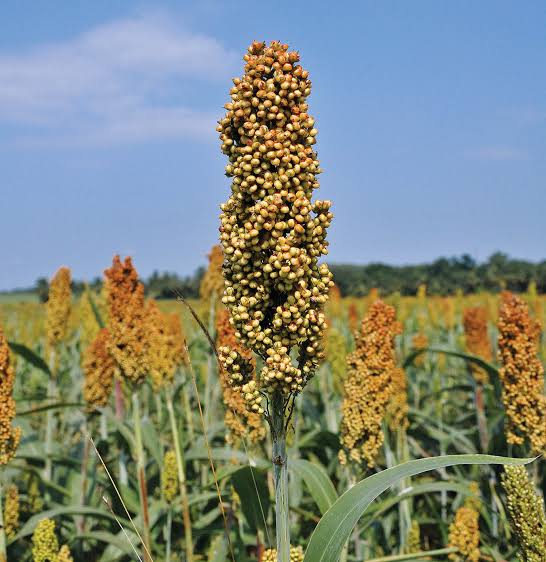Sorghum farmers in Kano State have expressed joy as the Institute for Agricultural Research (IAR), Ahmadu Bello University, Samaru, Zaria, through the Dry-land Crops (formally Accelerated Varietal Improvement and Seed Systems in Africa, AVISA) project released new sorghum varieties.
The newly released short-and medium-statured sorghum varieties include: SAMSORG 52, SAMSORG 53, and SAMSORG54, in its continuous efforts to solidify and promote agricultural practice among rural farmers.
The goal of the Dryland Crops project is to enhance the standard of living for small-scale sorghum, millet, groundnut, cowpea, and bean farmers and consumers.
Farmers in the community of Bagadawa town in Dawakin Tofa Local Government Area of the state were excited as the new short and medium-statured sorghum was showcased during a Field Day Demonstration held in the area.
- Young farmer harnesses potentials of organic hibiscus
- How traders’ invasion obstructs learning at 84-year-old school
The field day highlights the advantages and benefits of the new sorghum cultivars, which include their adaptability, high yield potential, and suitability across various agro-ecological zones.
Alhaji Danliti Dawanau, a sorghum farmer, said the newly introduced seed, which was grown in his farm as a demonstration plot, has surprised him, adding that the approach adopted in showcasing the variety has been convincing.
Despite the fact that he planted the newly introduced sorghum seed 32 days after planting his regular sorghum, harvest of the newly planted sorghum will be due before the regular seed.
“It was like magic, I never imagined that this could be possible, people thought I got the seeds from China, because in less than three months I will be harvesting my sorghum. I have made it a point of commitment to circulate these seeds to all farmers within this area in order to boost sorghum production,” he said.
Another farmer, Malam Shehu Isa Bagadawa, said he had been waiting for these varieties. According to him, when they noticed how sorghum planted in the demo farms was growing, they were amazed, so they kept a close eye on it to see how the farm progressed.
“To be honest, we were laughing at the owner of the farm at the initial stage, but when we started noticing the dramatic development of the plant, we became curious to see what would be the outcome of it. Here, we are today celebrating with the farmer, and I have resolved to get this seed and try it next wet-season,” he said.
Speaking during the event, IAR Executive Director, Professor Ado Yusuf, revealed that the field-day has helped in raising more awareness among rural farmers on the efficiency of the varieties and fostered market linkages, thereby strengthening the sorghum value chain.
Represented by the Assistant Director Research, Professor Lucious Joseph Bamaiyi, the executive director explained that the SAMSORG 52 was released in 2023 and has outstanding characteristics of early maturing sorghum of 85 to 90 days and an average height of less than one meter, adding that the SAMSORG 53 was also released in 2023, with an outstanding characteristics of medium maturing of 95 to100 days, as well as adaptive to Sudanese and Northern Guinean Savannah High grain and biomass yield.
He further revealed that the SAMSORG 54 was equally released in 2023, with outstanding characteristics of medium maturing of 95-110 day and adaptive to Sudanese and Northern Guinea Savannah semi compact elliptic panicle, white seed among other qualities.
In his remarks, the Country Director, International Crops Research Institute for the Semi-Arid Tropics, (ICRISAT), Dr Angarawai Ignatius, said the essence of developing the sorghum varieties was to meet up with the challenges faced by farmers as a result of climate change and insecurity in parts of the country.
According to him, the newly introduced sorghum can also be grown during the dry-season due to its adaptive nature.
He added that due to climate change and other challenges, they felt challenged to develop seeds varieties that can be cultivated early and harvested with a combined harvester, and that was why the varieties were released in order to prevent farms from being hideouts for criminals.

 Join Daily Trust WhatsApp Community For Quick Access To News and Happenings Around You.
Join Daily Trust WhatsApp Community For Quick Access To News and Happenings Around You.



